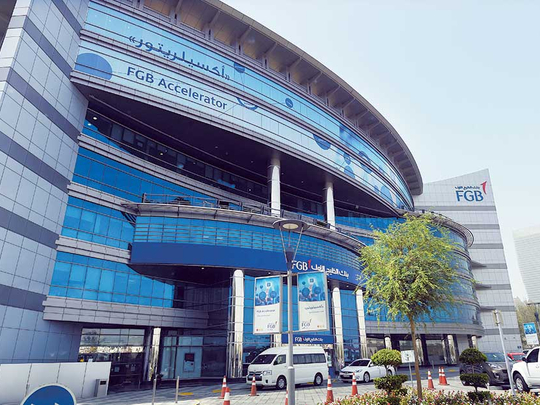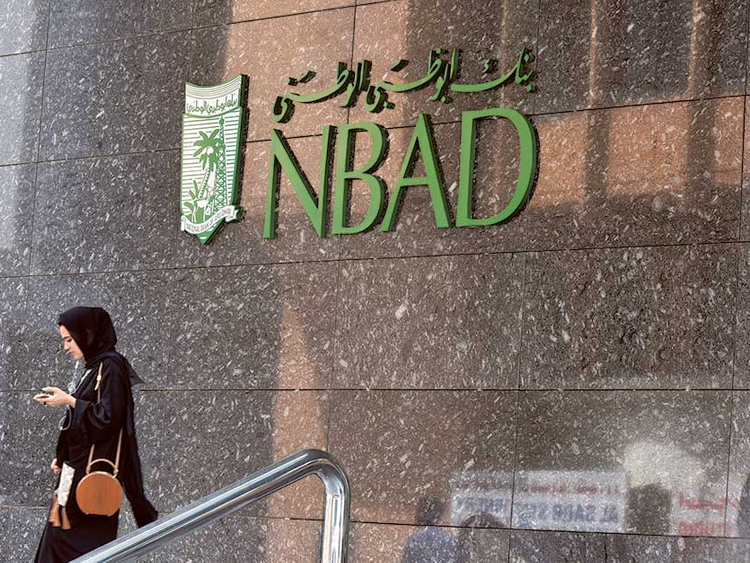
Abu Dhabi: The merger of FGB and the National Bank of Abu Dhabi (NBAD) is expected to reap a cost-saving opportunity of around Dh500 million a year, with the cost benefit representing eight per cent of the combined asset base.
In a presentation to analysts and investors on Sunday, the banks said that the cost benefits will be realised over three years, with an estimated one-time integration cost of Dh600 million.
The presentation followed an announcement that the boards of directors of NBAD and FGB banks have approved the merger of both entities in the first quarter of 2017. With Dh642 billion in total assets, the merged entity will be the largest bank in the Middle East and North Africa.
The merger will be executed through a share swap, with FGB shareholders receiving 1.254 NBAD shares for each FGB share they hold.
NBAD will issue a total of 5.6 billion new shares to FGB shareholders. Following the issue of the new shares, FGB’s shareholders will own approximately 52 per cent of the combined bank and NBAD’s shareholders will own around 48 per cent. The government of Abu Dhabi and related entities will own nearly 37 per cent.
The exchange ratio implies a discount to FGB’s shareholders of 3.9 per cent based on closing share prices on June 30, 2016, and a discount of 12.2 per cent to the three months’ average pre-leak share price on June 16, 2016.
Lower costs
“FGB had been relatively more aggressive in pursuing growth, had better capitalisation ratios, much higher margins, lower costs, and higher RoEs (returns on equity). Given these factors, the share swap ratio could have been more favourable for FGB shareholders,” said Vijay Harpalani, fund manager at Al Mal Capital in Dubai.
But it’s not just FGB shareholders who will have a larger portion of this merger. From a structural perspective, both the chairman and the chief executive officer of the merged entities will be from FGB’s current management team rather than NBAD’s.
The announcement on approving the merger sent NBAD’s and FGB’s shares soaring around five per cent and four per cent respectively in early trade as Abu Dhabi’s benchmark index ended the day 1.15 per cent higher. NBAD and FGB alone accounted for 72 per cent of the total trade value in Abu Dhabi.
“Shareholders of the merged entity will enjoy access to a much larger balance sheet with lower costs of borrowing, higher liquidity, better profitability, and capital ratios.
In my view, a large part of incremental growth of the merged entity is likely to come from international operations. As a result, competition in the domestic banking industry might actually reduce to some extent,” Al Mal’s Harpalani said.
Regulatory approvals
Though the merger was approved by each bank’s board of directors, it is still subject to various conditions including approval by at least 75 per cent by value of the shares represented at the general assembly meetings of FGB and NBAD. The merger is also subject to the receipt of all required regulatory approvals.
“Expansion across fast growing emerging markets presents a vast business opportunity for our customers and for us, as a larger, stronger, combined bank. We will have the capital, expertise and international networks to be the preferred financial partner for anyone doing business along the West-East corridor,” said Nasser Al Sowaidi, chairman of NBAD.
He added in a statement that the merged bank will act as a primary link for firms and governments looking at accessing regional and international capital markets.
Factbox: Leadership
After boards approved the merger between the National Bank of Abu Dhabi and FGB, the banks announced that the chairman designate of the merged entity is Shaikh Tahnoon Bin Zayed Al Nahyan, who currently serves as FGB’s chairman.
The CEO designate is Abdul Hamid M. Saeed who is now board member and managing director of FGB.
The vice-chairman designate is Nasser Al Sowaidi, who is currently NBAD’s chairman. The overall board of directors of the combined bank will include four nominated directors of FGB and four nominated directors of NBAD.
New board and management will assume the new roles when the merger becomes effective in the first quarter of 2017. Until then, Andre Sayegh and Alex Thursby will continue to lead their banks independently as group CEOs of FGB and NBAD respectively.













